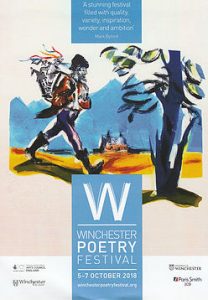It would not do for poetry awards to stoop to the depths of the Man Booker Prize in tolerating quoted odds on their shortlists. But I’m secretly backing The Republic of Motherhood by Liz Berry to scoop the 2018 Forward Prize for Best Single Poem, to be announced on Tuesday evening.
 Such an outcome would scatter welcome stardust on the Winchester Poetry Festival coming up in a couple of weeks, in which Liz Berry will switch roles and Judge the Winchester Poetry Prize.
Such an outcome would scatter welcome stardust on the Winchester Poetry Festival coming up in a couple of weeks, in which Liz Berry will switch roles and Judge the Winchester Poetry Prize.
Motherhood is in literary vogue; two of the five Forward shortlisted poems address that topic. One of the judges, vlogger Jen Campbell, has already declared her hand in an effusive close reading of The Republic of Motherhood, concluding that it is “one of my absolute favourite poems.”
If the judges happened to listen to Miss Berry’s wonderful reading of the poem on Radio 4’s Poetry Please on 22nd July, then I’d bet the farm on the award falling her way.
Liz Berry champions the dialect of the Black Country, through inclusion of its vernacular and through her own meticulous readings, the accent having survived university stints in Edinburgh and London. Her poem Homing is an unashamed manifesto to revive the suppressed accent of a close relative, kept “in a box beneath the bed”.
The unfamiliarity of this dialect narrows its associations: humour, diffidence, querulous, perceptive of domestic woes – these recollections filter through the many years since I lived in proximity to the Black Country, not that I was ever quite sure where it was.
Liz Berry’s poems are certainly not bounded by these characteristics, but they have not strayed far. The girlish wonder of her readings, confided in half-whispered Black Country modulations, has gilded the quality of her work, reviving interest in the sound of English and in live poetry events.
The Republic of Motherhood is different. The subject transcends geography and the mood is intimately disturbing, offering no respite from the shock of the new.
In a revealing interview in The Poetry Extension, Liz Berry recounts how, during her first pregnancy, she searched desperately for poems to help her come to terms with her experience: “it seemed all I could find were these gentle poems, these cradle songs…… I couldn’t find what I felt, which was this heat, this fury, hurt, and complexity.”
Public readings of The Republic of Motherhood therefore present a new challenge. How does the Black Country dialect relate to the text? Can it communicate anguish, disillusion, irony, polemic?
Alas, the Poetry Please recording has disappeared, thanks to the BBC’s hostile environment that is iPlayer for radio. My thoughts are therefore constrained by the memory of a single hearing.
I recall that the familiar questioning strain of the accent was kept in check by diminishing its rises and falls; the hesitancy of long pauses was gone. The pace of the reading was relentlessly forward, concentrating on the poem’s essential task of injecting irony into its title, somehow inverting our hardcoded warm feelings towards “motherhood”.
The text achieves this by frequent repetition of the M-word, dulling its traditional virtues, whilst aligning it with adverse experiences of the narrator. In the reading, Liz Berry sustained a minimalist crescendo of despair, with the slightest hint of a pause before each fateful phrase “of Motherhood”, so that you knew what was coming and anticipated the pain.
By the time the poem reached “the chapel of Motherhood”, this anticipation was almost unbearable. Appropriately, at that point the text crumples into its expletive-fuelled coda.
I felt that the reading was a triumph of versatility of the Black Country accent and the poet’s adaptation to her purpose. It perhaps raises the question of whether traditional text entries for poetry competitions should be accompanied by an audio file, now that technology is no barrier.
Setting aside the outcome of the Forward Prize, what remains is the challenge of persuading Liz Berry to read The Republic of Motherhood at the Winchester Festival. That won’t be easy; in announcing the winners of the Winchester Poetry Prize, the Judge would not normally contemplate presenting her own work. And Liz Berry’s other contribution is a workshop limited to 15 very fortunate aspiring poets.
******
The Republic of Motherhood, published by Granta
Natalya Anderson interviews Liz Berry in The Poetry Extension
Winchester Poetry Festival: October 5-7
Postscript: The Republic of Motherhood did win the prize and the Forward Arts Foundation has published a film of Liz Berry’s reading at the awards ceremony (I hesitate to instruct you scroll down past Danez Smith). Memory is deceptive but I think the BBC reading was slightly more edgy and effective.